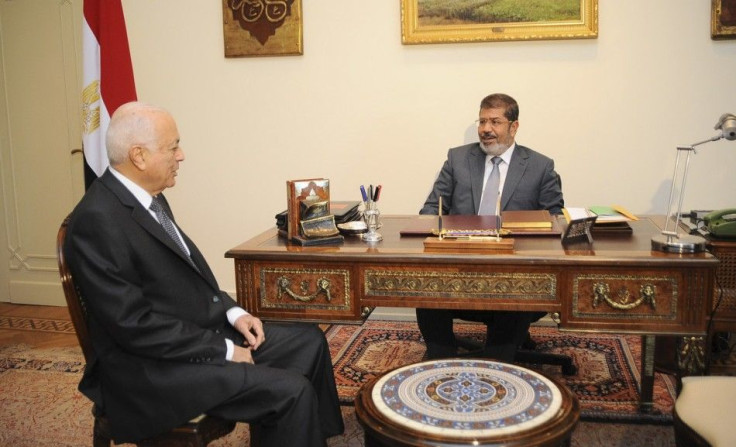Morsi Orders Egyptian Parliament Back, Defying Army

Egyptian President Mohammed Morsi ordered Parliament to reconvene Sunday, in defiance of the military and a court that dissolved it.
The Supreme Court had ruled parliament unconstitutional as party members contested seats reserved for independents. The military, then running the country, enforced the move.
But Morsi, whose Muslim Brotherhood-backed party won most seats, issued a decree annulling the court ruling and said the chamber should reconvene until a new election is held, the BBC reported.
The official Middle East News Agency said the military council had held an emergency session to discuss the decree. A member of the council, who declined to be identified, told Reuters the generals had not been given prior warning of Morsi's decision.
Muslim Brotherhood officials said Parliament could reconvene as early as Monday. But the BBC reports that the MPs would first have to get past police and military guards, who are keeping them out of Parliament.
The official Middle East News Agency said Morsi's decree called for new parliamentary elections to be held within 60 days of the adoption of a new constitution for the country, which is not expected before late this year, the Associated Press reported.
The decision will be seen as a direct challenge to the army, analysts say. Morsi's move appeared to be in defiance of the military's constitutional declaration announced on June 16 that gave it legislative powers and stripped him of much of his presidential authority.
Morsi was installed June 30 as the country's first freely elected president. But before his election, the army had granted itself sweeping powers and stripped the president of any authority over the military.
Morsi's decision fulfills one of his presidential campaign promises. The president's former party, Freedom and Justice, a political offshoot of the Muslim Brotherhood, controls almost half of the seats in the legislature. Together with the Salafi Nour Party, Islamists control more than two-thirds of the assembly, as Bloomberg Businessweek noted.
Meanwhile, President Barack Obama has invited Morsi to visit the United States in September, the Jerusalem Post reported Sunday, reflecting the new ties Washington is cultivating with the region's Islamists.
Washington, long wary of Islamists and an ally of ousted President Hosni Mubarak, shifted policy last year to open formal contacts with the Muslim Brotherhood, the group behind Morsi's win. Morsi formally resigned from the group after his victory.
President Obama extended an invitation to President Morsi to visit the United States when he attends the UN General Assembly in September, Egyptian aide Yasser Ali said after Mursi met U.S. Deputy Secretary of State William Burns in Cairo.
Burns, who did not mention the invitation at a conference earlier, pledged U.S. support for Egypt's battered economy and said he welcomed Mursi's promise to uphold treaties, which include a peace deal with Israel.
We have taken careful note and appreciated President Morsi's public statements about a commitment to obligations and we certainly attach great importance to Egypt's continuing role as a force for peace, Burns said.
Analysts said they had not expected an easy relationship between the army and the Islamist president, but had believed Morsi would tread cautiously to avoid a confrontation.
Everyone was expecting this to happen but not now, unless this decision was taken in agreement with the army council, but I doubt this, a political analyst, Mohamed Khalil, told The New York Times. This means he is taking legislative power from the army council and returning it to Parliament. So maybe in this period he needs certain laws to empower the government or to implement the 100-day plan for his first days in office.
The background to the decision was still not clear but the call for early elections could placate demands for a new parliament, he said.
Shadi Hamid of the Brookings Doha Center said the decision could be a compromise arrangement for the short term, so the military gets part of what it wanted -- a new Parliament in coming months -- and Islamists can avoid a situation where the military dominates a legislative authority.
© Copyright IBTimes 2024. All rights reserved.




















